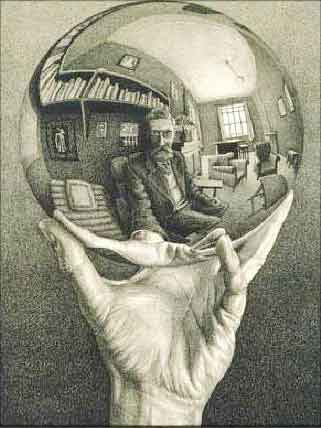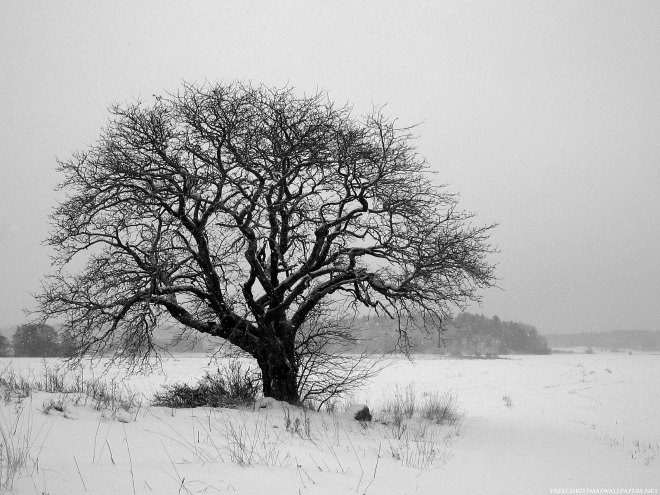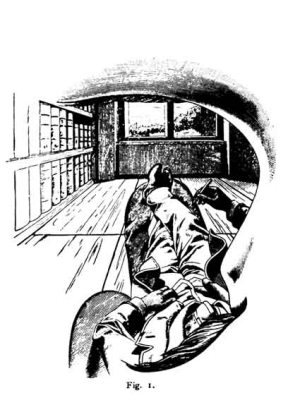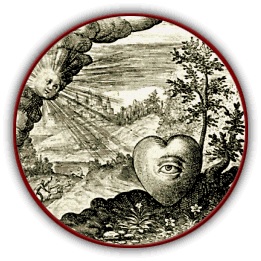Knowing is equated with seeing. If you see the light, it could mean that you see a light blinking on a radio tower or it could mean that you know something that makes you see everything different or it could mean both.
Philosophy is equated with thinking. Religion is equated with feeling. Today, like the physicist David Bohm, “we hold several points of view, in a sort of active suspension” (Dialogue). Like poet William Blake—”To see a World in a Grain of Sand, And a Heaven in a Wild Flower“—and like philosophers Søren Kierkegaard—we see the ‘eternal in the temporal’—and Ludwig Wittgenstein we say, “how extraordinary that anything should exist” (Lecture on Ethics).

Today we feel stoic acceptance of what the world throws at us. We say like Wittgenstein, “I am safe, nothing can injure me whatever happens” (Lecture on Ethics). With a “Click!” we connect to an awareness that leaves us feeling strangely lighthearted, for no apparent reason.
This feeling could best be described as “Self Actualization” as psychologist Abraham Maslow described, or as an “oceanic feeling” of limitlessness and oneness with the entire human race and universe as the mystic Romain Rolland described or it could be just one of those things: “What’s for supper?”
Today we go from a narrow self-centred perspective to a wider view of the world in its totality. We are ‘disturbed by joy’ like William Wordsworth was a few miles above Tintern Abbey:
“…I have felt a presence that disturbs me with joy
Of elevated thoughts; a sense sublime
Of something far more deeply interfused,
Whose dwelling is the light of suns,
and the round ocean and the living air,
and the blue sky, and in the mind of man” (source)

Religious belief and the lack thereof could be understood not as rival theories but as different ways of seeing. If a believer and an atheist look at a picture and one says it’s hideous and the other says it’s lovely, who’s right? who’s wrong?

Wittgenstein saw religion not as theoretical but as a “collection of pictures” reinforcing rules of life in the form of morality and a way of living that is itself what is eternal (Culture and Value, 1980). If someone taps into that eternal by living its ideal, one is living and being the eternal for a time like a leaf on a tree that is seasonal.
The world is factual. Facts are identifiable by science but facts can’t answer why you are here.
Like Wittgenstein said, “We feel that even if all possible scientific questions be answered, the problems of life have still not been touched” (Lecture on Ethics).
The philosopher Jean-Paul Sarte concluded in The Transcendence of the Ego that, “The World has not created the me: the me has not created the World” (p.105) but these two things are connected in a consciousness that is spontaneous. Sarte wrote, “Consciousness is always ‘of something‘, and therefore defined in relation to something else. It has no nature beyond this and is thus completely translucent” (source).

Some people picture a soul as translucent, as a kind of a ‘thing’—but not Wittgenstein. He said that if you look at soul language in religion, soul is not pictured as a thing but as integrity which is equally invisible. So if someone says, “He sold his soul for money” or “He sold his soul to the devil” it really means that he’s become materialistic. He has no deep moral sense and moral sense, as we know, is not visible.
A man may have everything but feel horribly afraid of what’s coming. A good man, however, enjoying a good way—tried, true and eternal through himself and those who live after—why, he has nothing to fear. Ever.
No matter what.
He can be light as a feather. He is not chained by anything material. He can never be judged as having lived a futile life even if he dies poor and unknown and didn’t do very much. After all, what does a sparrow do? What are flamingos for?

According to Maslow’s Hierarchy of Needs, a person can’t get to the highest level of “self-actualization” without making it by lower level needs such as food, sex and security.
To be self-actualized is to be unafraid of the unknown, untroubled by ambiguity and triviality, self-aware, accepting weaknesses while developing strengths, living a “meaningful life” by having a purpose that goes above and beyond one’s self to a greater good (see: Self Actual).

If you were asked, “Do you understand the difference between thinking and being?” what would you say?
Understanding the difference between thinking and being is like when police catch someone in the act of a crime and say, “What do you think you’re doing!” which is another way of saying, “How stupid are you?”
This is the exact moment when the cop and the criminal give their collective heads a shake. Most people (most of the time) see the world from inside a self-enclosed bubble of preoccupied thoughts that shape how the world is perceived. But this way of seeing is limiting because it sees a world perceived through language and opinion.
When a person with soul (and a clear conscience, if possible) wakes up, looks around and says full of happiness, “This is a miracle!” he isn’t just describing an event. It’s really his reaction to something significant that he is being, becoming and enjoying.


 A world view is how truth and reality is understood. It
A world view is how truth and reality is understood. It 



 Instead of three bears, picture three brains inside your skull like neuroscientist Paul MacLean (1913-2007) said there was.
Instead of three bears, picture three brains inside your skull like neuroscientist Paul MacLean (1913-2007) said there was. The neo-mammalian (or neocortex) is the seat of perception and imagination. Whether religious or not, the three brains theory allegorically explains why people think and do what they think and do do.
The neo-mammalian (or neocortex) is the seat of perception and imagination. Whether religious or not, the three brains theory allegorically explains why people think and do what they think and do do. Lower brains are said to be instinctive. Their concern is with reproduction and dominance, sometimes necessitating deception and violence.
Lower brains are said to be instinctive. Their concern is with reproduction and dominance, sometimes necessitating deception and violence. But in rare moments, when there are no demands put upon us, when one is quiet and comfortable, in such a peaceful interval, we are free to enter a higher mental state. When released from pride, ambition and self-justification, one looks at others not with criticism and judgement, but with a realization.
But in rare moments, when there are no demands put upon us, when one is quiet and comfortable, in such a peaceful interval, we are free to enter a higher mental state. When released from pride, ambition and self-justification, one looks at others not with criticism and judgement, but with a realization.






 Really? A cat is a complex machine. You’re a complex machine. No wonder people treat each other like machines. According to science, we are machines.
Really? A cat is a complex machine. You’re a complex machine. No wonder people treat each other like machines. According to science, we are machines.



 You see your breath in the air and ask: “Who are you?” Who but you would know? Why not look into what it’s like being you – first person, singular, present tense? “Would you want to live and die without looking at the one doing that?” asked Douglas Harding.
You see your breath in the air and ask: “Who are you?” Who but you would know? Why not look into what it’s like being you – first person, singular, present tense? “Would you want to live and die without looking at the one doing that?” asked Douglas Harding.



 In the 1600’s Traherne wrote, “You never enjoy the world aright, till the Sea itself floweth in your veins, till you are clothed with the heavens, and crowned with the stars.” Traherne was a philosopher of enjoyment. He wrote, “Your enjoyment of the World is never right till every morning you awake in Heaven” (Centuries of Meditation). Wade (1944) writes of Traherne, “In the middle of the seventeenth century, there walked the muddy lanes of Herefordshire and the cobbled streets of London, a man who had found the secret of happiness… He became the most radiantly, most infectiously happy mortal this earth has known” (p. 2). This is the secret: It is in paying attention without thinking. Don’t be fooled by personality.
In the 1600’s Traherne wrote, “You never enjoy the world aright, till the Sea itself floweth in your veins, till you are clothed with the heavens, and crowned with the stars.” Traherne was a philosopher of enjoyment. He wrote, “Your enjoyment of the World is never right till every morning you awake in Heaven” (Centuries of Meditation). Wade (1944) writes of Traherne, “In the middle of the seventeenth century, there walked the muddy lanes of Herefordshire and the cobbled streets of London, a man who had found the secret of happiness… He became the most radiantly, most infectiously happy mortal this earth has known” (p. 2). This is the secret: It is in paying attention without thinking. Don’t be fooled by personality.
